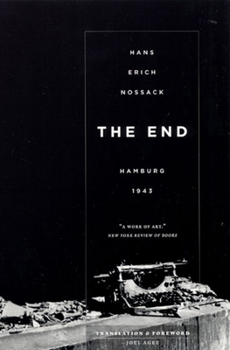The End: Hamburg 1943
Select Format
Select Condition 
Book Overview
One didn't dare to inhale for fear of breathing it in. It was the sound of eighteen hundred airplanes approaching Hamburg from the south at an unimaginable height. We had already experienced two hundred or even more air raids, among them some very heavy ones, but this was something completely new. And yet there was an immediate recognition: this was what everyone had been waiting for, what had hung for months like a shadow over everything we did,...
Format:Paperback
Language:English
ISBN:0226595579
ISBN13:9780226595573
Release Date:December 2006
Publisher:University of Chicago Press
Length:112 Pages
Weight:0.35 lbs.
Dimensions:0.4" x 6.5" x 7.9"
Customer Reviews
5 ratings
Another Reality
Published by Thriftbooks.com User , 14 years ago
The original title of THE END is DER UNTERGANG, which means "the destruction," "the downfall," "the collapse." Translator Joel Agee, bearing in mind the "total collective ruin" narrated in the book, chose the title he did. Other possibilities might have been "The World Gone Under," "Fallen Away," or even "Everything in Ruins," but perhaps these alternatives are too descriptive, and the translator is right. In context, the original title signifies the end of the world that is known. Author Hans Nossack wrote down his account three months after the Allied incendiary bombing of Hamburg in July 1943. Operation Gomorrah burned up fifty thousand lives. Nossack and his wife escaped by pure chance. In the first lines he explains that he could not delay writing for fear that his mind would return to the usual ways of thinking, with their conventional verities, and lose its ability to relate the other reality of his experience. The resulting short work--63 pages of inexplicably small type--must be called a memoir, yet is something quite different: the record of a mental state, the way a person thought after being stunned into a new or previously unrecognized reality. Agee, in his short foreword, calls it a report, a testimony, yet notes that it is unbalanced as reportage and not always factual as recollection. Reality has changed, so its description falls outside of any genre. The author is still in shock but emerging from his altered state, recovering his literary powers, but as yet unable to pull himself out of the void. One can read the book as a historical document, but there is little attention to the dead, to the horrors that everyone would expect, and close attention to little details and missing objects. The Nazis and the Allies fighting the war do not seem to exist. The survivors of the bombing who need to bind together understand their special category without words and resent direct expressions of the obvious. They are like zombies. There is an occasional blurring between real and imagined or semi-hallucinatory events. It is bleak, streetless and chilling. Reading this book is like bending over a person lying in the road who softly tells you what he feels and what is numb, what is important and what no longer matters, what is real and what is not. Why stop and listen? Why dip into another's misery, now so old? Well, for one thing, we always need to consider the most horrible possibilities. For another, we are still jumpy after the attacks of 9/11, and perhaps can profit from an account of ultimate disaster and survival. For a third, it is good for the soul to look back to Hamburg 1943 and hear from the victims, since it is always better to identify with victims, whether they be Jews in Nazi concentration camps or German citizens in Allied firestorms. But one advisory: don't read this book for its literary quality. It's too real for that.
The real Abyss, Haunting, Superb
Published by Thriftbooks.com User , 15 years ago
In 1943 Hans Erich Nossack wrote a short narrative of his life as Hamburg was fire bombed by the Allies. Nossack was not in the city for the fire bombing, but his words tell a painful and mesmerizing tale of life immediately after the bombing. His poignant story is difficult to read due to the pain that comes from the pages through his words. They hit hard and without mercy. There are not any vengeful thoughts or anything negative, just the feelings that have transcended from that dark time in 1943 to today. I highly recommend it.
What War Means
Published by Thriftbooks.com User , 16 years ago
Since this book was written within three months of the siege of Hamburg, the reader can walk through the noise, the terror, the human cost, and experience all the carnage through Nossack's eyes. We Americans have never, thank God, lived through a protracted and relentless bombing campaign. Nossack writes from the immediacy of the horror and his ability to write through the shock gives the book an eyewitness account of losing and not even recognizing his beloved city. I think we can also see how far removed the average citizen was from Nazi fanatacism and how little, at this point, they believed or cared about anything Hitler's government had to say. This is a five star book. Pat O'Hagen
Interesting eye-witness account
Published by Thriftbooks.com User , 17 years ago
This slim volume provides an eye-witness account of the Hamburg bombings of 1943. The devastation to the city is horrible, but the author's feelings toward the bombers would be unusual in today's society. Thought provoking.
Poetic revelation
Published by Thriftbooks.com User , 18 years ago
This little book takes about 40 minutes to read. It is not what you might expect. It is not a minute by minute account of what happened during the bombing. It does not give statistics or even mention many things about the appearance of the city or many of the horrifying things that happened. It is a revelation of what it felt like to lose everything. And it is truly beautifully written. Few people can write poetically much less translate poetically.




